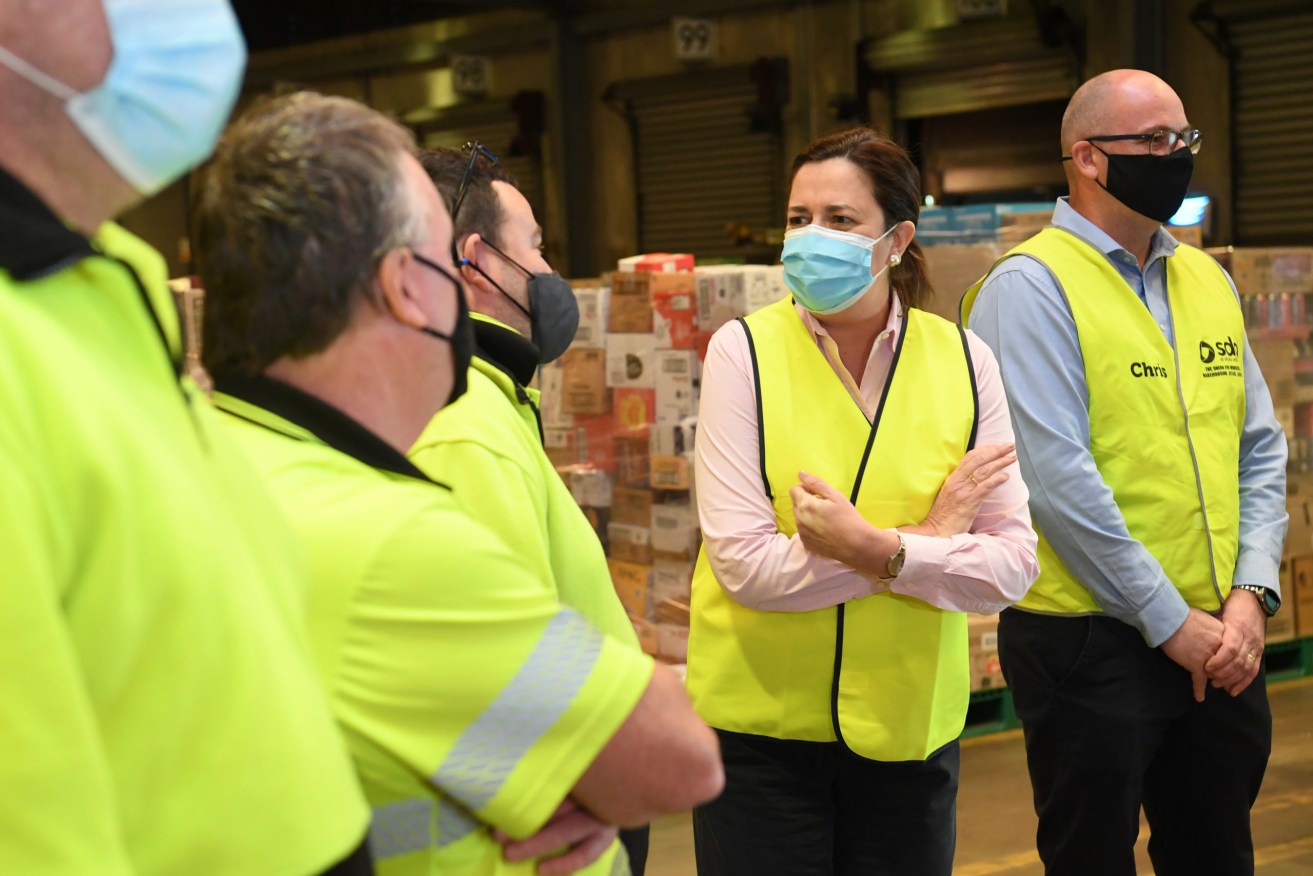Qld prepares for the worst, moves to secure food supplies, vaccinate workers
With more than 900 new cases down south, Queensland is preparing for an inevitable outbreak of the Delta variant by moving to protect workers at food distribution centres and meat processing plants.

Queensland Premier Annastacia Palaszczuk (centre) is seen talking to workers during a press conference at the Woolworths regional distribution centre at Larapinta. (AAP Image/Darren England)
When the recent Indooroopilly cluster led to major supermarket chains being unable to promptly deliver groceries to thousands of people in home quarantine, the State Government had to organise volunteers to help.
The government had already prioritised food distribution centre workers for vaccines but the take-up has been low. With additional Pfizer vaccines now coming into Queensland, the government will take the jabs to 28 food distribution centres and meat processing plants, rather than wait for workers to make an appointment themselves.
Premier Annastacia Palaszczuk made the announcement today at the Woolworths distribution centre in Larapinta, south of Brisbane, as NSW, Victoria and the ACT continued to report COVID-19 cases.
NSW reported 818 new community cases, and another three deaths, while Victoria reported 71 new community cases, and the ACT had yet to report additions to its tally of 19 yesterday.
While Queensland reported just two new cases – a lingering case from the Indooroopilly cluster, and a returned overseas traveller linked to another case, all of whom were in quarantine while infectious – there continued to be cases just south of the border.
“It’s like a waiting game,” Palaszczuk said today, of the prospect someone will bring the Delta variant into Queensland from NSW.
“Any day, this could change, and we need to be ready.”
Queensland Health has already moved to address weaknesses in vaccination coverage by moving more jabs to border towns, establishing new hubs in Logan and Caboolture, and targeting First Nations people in urban areas, in addition to mobile units in Cape York.
However, there are still lower than expected rates in aged care and disability services – largely the responsibility of the Commonwealth, unless residents and workers register to be vaccinated by Queensland Health – and, geographically, in areas around Mackay and the far west.
As of Sunday, 46.3 per cent of eligible Queenslanders had one dose, and 27.7 per cent two doses, which was below the national average of 52.3 per cent and 30 per cent respectively.
Health Minister Yvette D’Ath said the arrival of more Pfizer doses last week, and more shipments in the coming weeks, meant Queensland Health had been able to halve the waiting list.
But D’Ath said more registrations were needed as just under 80,000 people were currently on the list – not even enough for a week of bookings – and Queensland Health was ready to surge.
“If you are 16 to 59 and you haven’t been able to get a booking with a GP who is delivering the Pfizer, we have Pfizer,” D’Ath said.
Prime Minister Scott Morrison gave a press conference this morning to encourage the States and Territories to give people hope of freedom from lockdowns, by sticking to previous thresholds of 70 per cent and 80 per cent coverage of eligible Australians for restrictions to ease.
Palaszczuk is concerned by the prospect of Queensland having to open up to NSW, once NSW reaches the vaccinations, even if Queensland still has gaps and the NSW is ongoing.
Morrison, who declined to nominate Queensland as an opponent to freedom, said there was a need to stick with the plan “otherwise we stay in the cave forever”.
“If not at 70 per cent, and 80 per cent, then when,” Morrison asked journalists in Canberra.
“Then when?”
But Palaszczuk said the plan was based on a much smaller number of active cases, before the Sydney outbreak had spread, and National Cabinet acknowledged the need for further research and modelling.
She said the 70 per cent and 80 per cent targets still allowed for “some limited restrictions and some limited or specified lockdowns” but it was too early to be confident that the Sydney outbreak could be brought under control.
“The goalposts have changed,” Palaszczuk said.
NSW Premier Gladys Berejiklian today repeated her call for other states to prepare to be living with COVID-19 once vaccination rates are sufficient.










